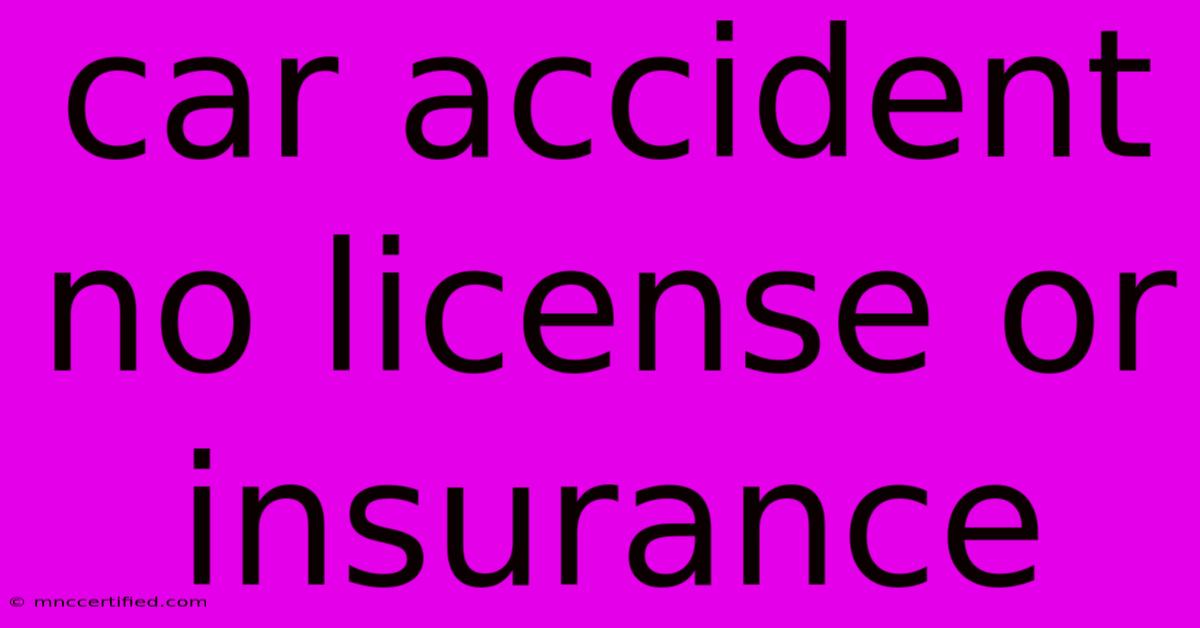Car Accident No License Or Insurance

Table of Contents
Driving Without a License or Insurance: What Happens After a Car Accident?
Getting into a car accident is stressful enough, but the situation becomes significantly more complicated if you were driving without a license or insurance. This scenario can lead to hefty fines, legal trouble, and a significant financial burden. Understanding the potential consequences and your legal rights is crucial in navigating such a challenging situation.
The Consequences of Driving Without a License or Insurance
1. Legal Penalties:
- Driving Without a License: Depending on your state, driving without a license can result in fines, jail time, or a combination of both. You might also face a suspension or revocation of driving privileges.
- Driving Without Insurance: Driving without insurance is usually considered a serious offense and often carries stricter penalties than driving without a license. You can expect hefty fines, suspension of your driving privileges, and potential jail time.
2. Financial Consequences:
- Accident Costs: You are responsible for covering the costs of any damage you cause in an accident, including vehicle repairs, medical expenses, and lost wages.
- Legal Fees: Legal representation can be expensive, especially if you face criminal charges.
- Higher Insurance Premiums: If you eventually get your license and insurance, your premiums will likely be much higher due to your past driving record.
3. Potential Impact on Your Future:
- Driving Privileges: A conviction for driving without a license or insurance can make it difficult to obtain a license in the future.
- Employment: Some employers conduct background checks that might reveal your driving record, potentially impacting your job prospects.
What to Do After a Car Accident Without a License or Insurance
1. Stay Calm: Your initial reaction should be to ensure the safety of yourself and everyone involved in the accident.
2. Call the Police: Report the accident to the police immediately. They will document the incident, investigate the cause, and determine liability.
3. Exchange Information: If possible, exchange contact information and insurance details with the other driver. This is crucial for insurance claims and legal proceedings.
4. Document the Accident: Take photos of the accident scene, damage to vehicles, and injuries. Write down details like the date, time, location, and any eyewitness information.
5. Seek Medical Attention: Even if you feel fine, it's crucial to seek medical attention after any accident. Injuries may not be immediately apparent.
6. Consult with a Lawyer: Contact a lawyer specializing in traffic offenses as soon as possible. They can advise you on the legal implications of your situation and represent you in court.
Legal Options and Defenses
While driving without a license or insurance is a serious offense, there may be some legal defenses available, depending on your specific circumstances. These could include:
- Lack of Knowledge: You might argue that you were unaware you were driving without a valid license or insurance.
- Emergency Circumstances: If you were driving to get emergency medical help or fleeing a dangerous situation, your actions might be deemed justifiable.
Avoiding Future Trouble:
- Obtain a Driver's License: Ensure you are legally permitted to drive by obtaining a valid driver's license.
- Get Car Insurance: Purchase auto insurance that meets your state's minimum requirements.
- Be Responsible: Drive safely and follow all traffic laws.
Conclusion
Driving without a license or insurance can have significant consequences, including hefty fines, legal battles, and financial strain. By understanding the potential repercussions and taking necessary steps to protect yourself, you can navigate a challenging situation and avoid future complications. Always prioritize safety and responsibility when operating a vehicle. Remember, it's always best to be informed, proactive, and to seek legal counsel if you are facing this situation.

Thank you for visiting our website wich cover about Car Accident No License Or Insurance. We hope the information provided has been useful to you. Feel free to contact us if you have any questions or need further assistance. See you next time and dont miss to bookmark.
Featured Posts
-
Warriors Edge Opponent Currys Late Dagger
Nov 11, 2024
-
Eagles Cowboys Inactives Week 10 Matchup
Nov 11, 2024
-
La Portas Week 10 Performance 66 Yards Td Shoulder Injury
Nov 11, 2024
-
Wolf Hall Tv Review Of Part Three
Nov 11, 2024
-
La Liga Live Real Sociedad Vs Barcelona On Eurosport
Nov 11, 2024